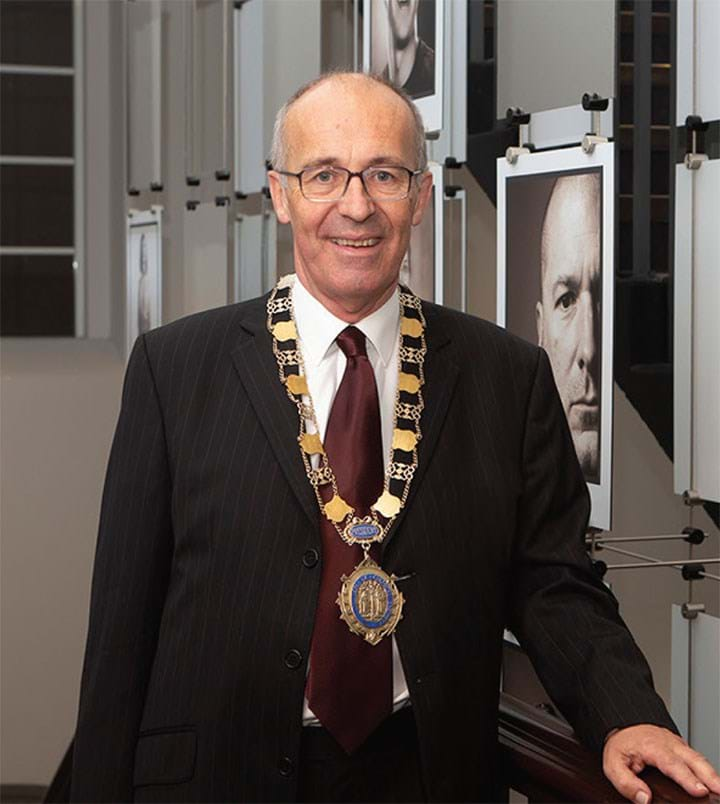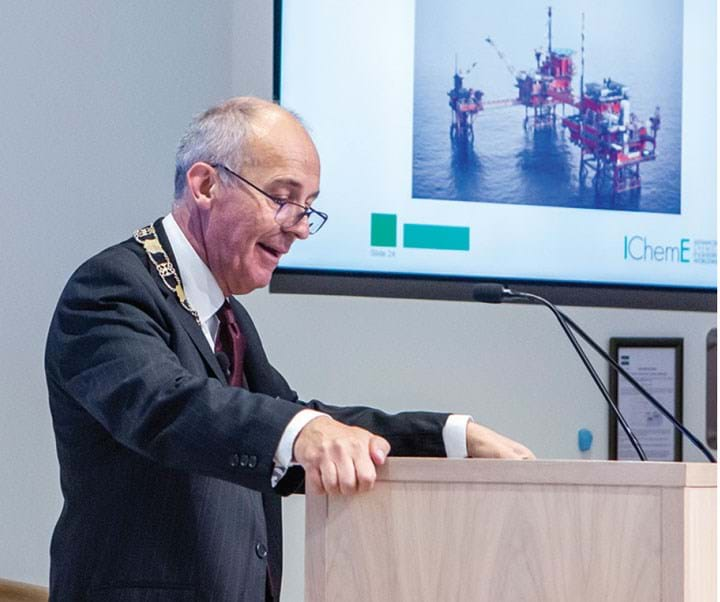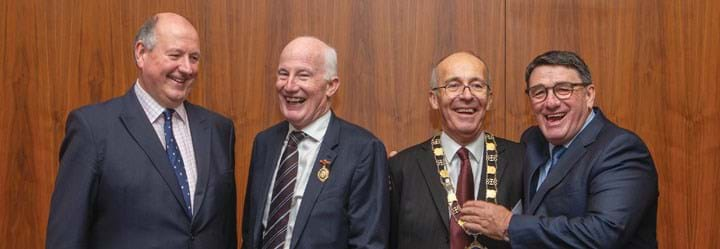Spiralling Up
Stephen Richardson talks to Adam Duckett about his ambitions for IChemE

THERE’S a sense of both transition and constancy with Stephen Richardson’s IChemE Presidency.
As I watched Richardson deliver his Presidential Address in London on 12 November (you can watch a recording at the link below) I mentally ticked off the references that he made to the Presidents who have come before. It is notable how far back he has reached for his cues, calling out and commending the work of Ken Rivers, John McGagh, Jonathan Seville, Geoff Maitland, Dame Judith Hackitt, and Sir William Wakeham.
This is deliberate, Richardson told me: “I want to show there is a common thread running through what we’re doing. There is a common sense of direction and purpose.”
This encompasses and builds on the evolution of IChemE’s governance (kickstarted by Seville); the calls for IChemE to lead on process safety (raised by Rivers); climate change (Maitland); digitalisation (McGagh); and systems thinking (Hackitt and Wakeham).
Yet simultaneously it feels like there is a separation from what went before – a transition from the challenges that IChemE has faced in recent years, including its EGM in 2018. This shift might not feel so apparent had circumstances been different; had they not prompted Andrew Thompson to withdraw from becoming President and a replacement sought; and had IChemE not pushed ahead with such a significant programme of change that has involved the implementation of a new governance structure, the development of its learned society role, and the launch of its five-year strategy.
“I want to show there is a common thread running through what we’re doing. There is a common sense of direction and purpose.”
Asked why he put himself forward to become President, Richardson said he always wanted to give more back to IChemE but had previously resisted putting himself forward while he was working full time. Having stepped down as Associate Provost at Imperial College London, Richardson said it felt like IChemE “needed somebody” and it might be helpful if that somebody had not been directly involved with helping to address the challenges faced in recent years.
Community engagement
This isn’t to imply that Richardson will be distant. Quite the opposite. At the end of his speech he put his email address up on the screen and invited members to contact him directly.
“If there is anything they want to discuss about anything to do with IChemE…I’m very happy to do it,” he told me, adding that he intends to meet with as many community groups as he can during his 18-month term. Face-to-face or virtually, he wants to meet with every members group, special interest group, and university chemical engineering department.
Before getting to Richardson’s specific plans for his Presidency, I asked him what he’s passionate about outside of chemical engineering.
“Gardening is what I enjoy. It’s physical as opposed to mental and so when you’ve had a day in the office or on the train commuting, to be able to do something very different
is fun.”
There’s also hiking, classical music, and you can hear the contentment in his voice as he talks about seeing his grandchildren grow up.
Keeping busy is essential, he explains: “My idea of hell is having a Sunday afternoon with nothing to do.”
This energy is reflected in Richardson’s volunteering roles, having served as a membership interviewer; the Secretary, Deputy Chairman and Chairman of the Oil & Natural Gas Special Interest Group; member of the Books board; editorial board member of the IChemE journal Process Safety and Environmental Protection; editorial consultant for IChemE’s journals; Deputy President; and now President.
Defining moment
His journey into chemical engineering follows a well-trodden path. It’s the familiar tale of a schoolchild passionate about chemistry and “repairing things” who through a chance meeting with a knowledgeable type had his head turned towards the practical promise of chemical engineering. For Richardson, the next step was an undergraduate degree at Imperial College; then a PhD; teaching and research followed; and then into management, heading the chemical engineering department, then the Faculty of Engineering and finally becoming Associate Provost.
Asked to share what he considers the defining moments of his career, one of the points Richardson picked out was his co-development of a depressurisation software package that is widely used by the oil and gas industry. This is a result of his work on modelling depressurisation, which has been the focus of his research for more than three decades.
“I’m very proud that the computer programme that Graham Seville and I wrote, called Blowdown, is out there on 300–400 oil and gas installations worldwide. That’s quite gratifying as that means around 20% of the world’s big platforms use our program.”
Safety has been a major influence on Richardson’s career and was reflected in the title of his address: ‘Process Safety: The Big Picture and the Systems Approach’
Safety has been a major influence on Richardson’s career and was reflected in the title of his address: Process Safety: The Big Picture and the Systems Approach.
He told the audience that he remains proud and relieved that every installation that his software has been used on has not had an accident or near miss. The development of the software has led Richardson to investigate a number of major process industry incidents and he used his address to review the key lessons from the Piper Alpha disaster, which killed 167 men. Richardson was an expert witness during the investigation.
“Apart from getting married to Hilary, who is here tonight, and the birth of our children and grandchildren, the Piper Alpha disaster on 6 July 1988 was probably the most significant event in my life.”
Photos that show the Piper Alpha disaster as it unfolded will never lose their raw impact. Richardson used them with poignant effect to explain how platforms feeding oil to Piper Alpha were also reliant on it for their communications links. Struck deaf and dumb by the disaster unfolding on Piper Alpha, these platforms continued pumping hydrocarbons to their stricken neighbour, feeding the inferno.
“My corollary is: safety is nothing without a systems approach,” said Richardson.

Unified approach
This leads to the themes that Richardson has highlighted as priorities for his presidency. The first is to make IChemE even more of a leading voice in process safety. I asked Richardson to unpack this a little more and he said he wants to see IChemE work with other PEIs to explore how systems thinking might be better applied in other engineering disciplines, including following chemical engineering’s lead and making safety a mandatory element of every engineering degree.
He is also keen to have a conversation with the community of members leading IChemE’s safety-related efforts, including the Loss Prevention Bulletin, Safety and Loss Prevention SIG, and Hazards conferences, about how they might improve coordination.
“I think we’re operating at 85% and we could be at 98% so easily,” he said, noting a more unified approach will help our community better retain lessons learned and convince other disciplines to see the benefits of our systems thinking approach.
“I think our voice is going to be heard very much better if we’re joined up.”
Richardson’s second theme is support for chemical engineering departments. He spoke about his concerns that departments will become hollow at the centre “like creosote brushes” unless they embrace coming changes in the profession, such as the application of digitalisation, and roll this into teaching.
“It’s coming and it’s going to make a massive change in that we’re going to have rethink aspects of our undergraduate course design, delivery, accreditation… and CPD or we’re going to get left behind.”
He noted that IChemE is already working on this, and Richardson along with several other trustees including McGagh have met with representatives from other PEIs to discuss next steps. This builds on the priority in IChemE’s five-year strategy to enable digital literacy.

Fit for the future
With IChemE’s centenary initiative planned for 2022, Richardson’s third theme is about looking ahead and preparing the Institution for the future.
“If we’re going to be relevant for the next 100 years, I think IChemE must speak up, say more, and do more on climate change,” he said, noting the “tremendous work” that IChemE’s Energy Centre has done, but the lack of a readily identifiable position on IChemE’s website.
“If we don’t, we’re going to get stuck with some really strange policies that have little or no evidential basis.”
When Richardson and I spoke, we discussed the challenges IChemE faces given the inherent vested interests of members working in the oil industry. He explained that during private conversations with oil industry interests he has seen an acceptance that action must be taken, though is wary that the pace of change has been too slow at times. On the flipside, he notes that the Extinction Rebellion climate campaigners are right that we must abandon fossil feedstocks. But doing it immediately is not realistic.
“How do we present the argument that ‘yes, that is the right end point but it’s not [achievable] tomorrow?’ But nor is it [right to delay it for] 50 years’”. The answer, he said, is developing a position paper that helps secure buy-in from industry and allows IChemE to sensibly engage with the Greenpeaces of this world.
Full potential
The fourth theme is to encourage more people to volunteer.
“Getting more members to become more involved is key to everything,” he said. This will be foundational to IChemE achieving its strategic aims. To support this, Richardson said he wants to explore how IChemE can launch new awards that recognise the volunteers who help IChemE reach its full potential.
“I would like it to spiral up”.
“The final thing I’d like to do is [discuss] building trust. I’m not going to go into any of the events of the last couple of years,” he said during his address, noting only that efforts must continue. “Trust is something that doesn’t just happen, it’s something that happens by people working at it continuously.”
At this point, Richardson said he’s open to members contacting him directly. If you have anything you want to discuss, email: president@icheme.org
To watch the full address, visit: https://youtu.be/L4zjuFuYH2k
Recent Editions
Catch up on the latest news, views and jobs from The Chemical Engineer. Below are the four latest issues. View a wider selection of the archive from within the Magazine section of this site.




